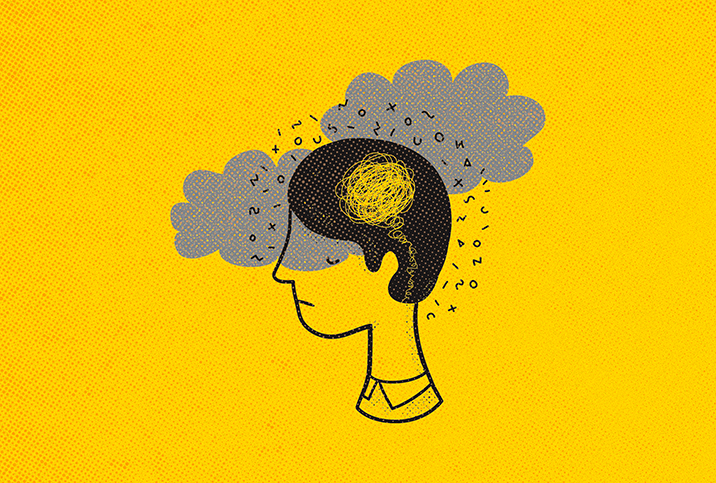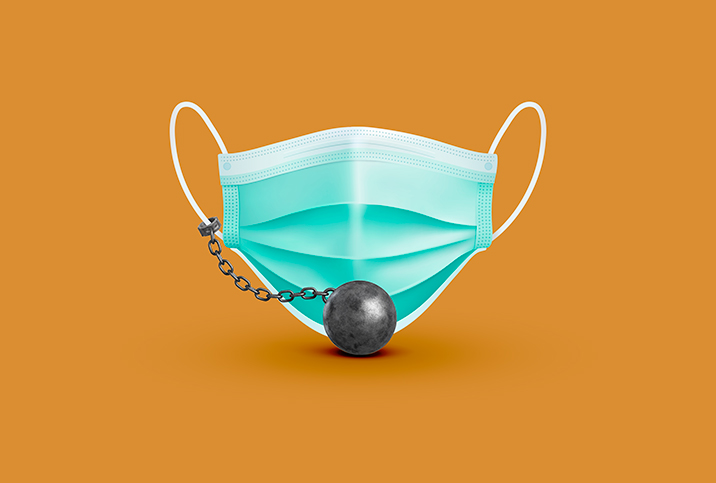Are We in the Middle of a Mental Health Crisis?

In times of great upheaval, our mental health can suffer, especially when there is little we can do to control what's happening around us.
Even though the global mental health crisis has been framed as purely psychological, the reasons behind it are tangible in the world we read about, watch on TV and discuss online. In June 2022, President Biden acknowledged the issue in a speech to the nation about gun control, announcing "there is a serious mental health crisis in this country." He called for more mental health services for both students and teachers, as well as additional funding to provide vulnerable children with privacy protection from social media.
The American Foundation for Suicide Prevention reported that 45,979 Americans died by suicide in 2020, the 12th-leading cause of death in the country that year. However, 93 percent of citizens feel suicide can be prevented in some cases and 78 percent would be ready to help someone who may be suicidal.
Starting with schools
Research carried out at the University of California San Francisco indicated 48 percent of people ages 18 to 25 struggled with mental health symptoms during 2021. It is especially important that support for mental health begins at a young age as the Centers for Disease Control and Prevention (CDC) found 1 in 6 children ages 2 to 8 in the United States have a diagnosed mental, behavioral or developmental disorder.
Hillary Schoninger, L.C.S.W., is an individual and family psychotherapist in Chicago who has worked as a school social worker. From her experience, Schoninger identified the school as an area in need of more resources and trained counselors.
"Therapists and social workers in schools can help many children cope with their mental health and be the safe people children need," she said. "This is because these people are some of the safest people children can go to regarding how they're emotionally functioning."
Many of us have little control over our cultural landscape and we may feel anxious or fearful when faced with uncertainty.
As a psychotherapist, she emphasized the importance of this emotional support.
"When we repress our feelings, they will always return to find us and make our emotional work harder," Schoninger said.
Many of us have little control over our cultural landscape and we may feel anxious or fearful when faced with uncertainty, said Chase Cassine, L.C.S.W., a behavioral health specialist at DePaul Community Health Centers in New Orleans. He explained that we're hardwired to feel afraid of perceived threats due to our "fight-or-flight" response, the physiological reaction to any stressful situation.
Cognitive behavioral therapy (CBT) is the method he uses with clients to "identify automatic negative thoughts, [and] evaluate and replace them with more rational ones. [It is] when we lean into the discomfort and sit in it that we are able to learn, grow and practice self-acceptance," he said.
You need a plan
Doreen Marshall, Ph.D., vice president of mission engagement at the American Foundation for Suicide Prevention, gave this advice to help protect our mental health, both in times of crisis and in everyday life:
- Create a self-care plan that prioritizes your physical and mental health. Get enough rest, drink more water and try your best to get regular exercise.
- Have open and honest conversations as they can open up opportunities for support and build mental health resilience.
- Separate what is in your control and what is not. For example, things you can control are taking vitamins or limiting your consumption of upsetting content.
- Set realistic daily goals to help give yourself a sense of accomplishment without feeling too burdensome.
- Stay in the present by engaging in mindfulness activities, such as meditation or yoga.
- Turn to the people in your life who are supportive and provide a safe space to discuss what you're feeling. You can also speak to the Crisis Text Line by texting TALK to 741741 or the 988 Suicide & Crisis Lifeline at 988.
Rodney Luster, Ph.D., a licensed professional counselor at Inspirethought Counseling in Texas, explained that humans often count on certainty.
"When such certainty is fractured, the opportunity for perseverating fears and anxieties becomes more prevalent," he said.
The pandemic has created what he calls rapid onset of change that has further perpetuated mental health issues alongside "cultural conflicts and policing issues" that have created yet more insecurity.
He recommended these steps to help deal with fear in uncertain times:
- Establish routines to frame your reality with purpose and goals for the day. These activities may be as simple as cutting the grass, washing the dishes or going for a mindful walk.
- Find a sense of meaning in the chaos of uncertainty. You can then begin to see the bigger picture and the deeper meaning in your circumstances.
- Get grounded and engage with all of your senses. Taking a moment to step out onto the grass in bare feet can help you feel grounded and aware of the self.
- Practice radical acceptance to lessen feelings of being relegated to the "victim" of your circumstances.
There are a plethora of collective actions that the U.S. can take to improve the lives of its citizens. Marshall believes the government needs to invest in suicide prevention and research, mental health, substance use disorders and their related treatments, as well as increasing the availability of evidence-based treatment programs. She explained this research must "develop and expand culturally informed, evidence-based quality mental healthcare for diverse and minority populations, as well as underserved communities."
Employers can help
Marshall pointed out that employers have a big part to play. The majority of people who die by suicide are ages 18 to 64: working age.
Luster recommended organizations adhere to psychological performance enhancements (PPEs) to establish dialogues with employees and listen to what they have to say about the challenges they may be facing in life and in the workplace. He added that psychological training can help employees manage stress and develop their skills, and allow for activities for empowerment.
Marshall highlighted the efforts of the Workplace Suicide Prevention Initiative, a collaboration of groups advocating to prevent suicide through an evidence-based program that employers can sign up for and use.
In particular, she said healthcare providers and hospitals need better staff training, tools and resources to support mental health and identify suicide risks. These assets would help them to "make accurate assessments and treatment decisions, and implement interventions that can have a dramatic, lifesaving impact," she said.
All organizations have a role to play in improving mental health and suicide prevention interventions, Marshall concluded.




















